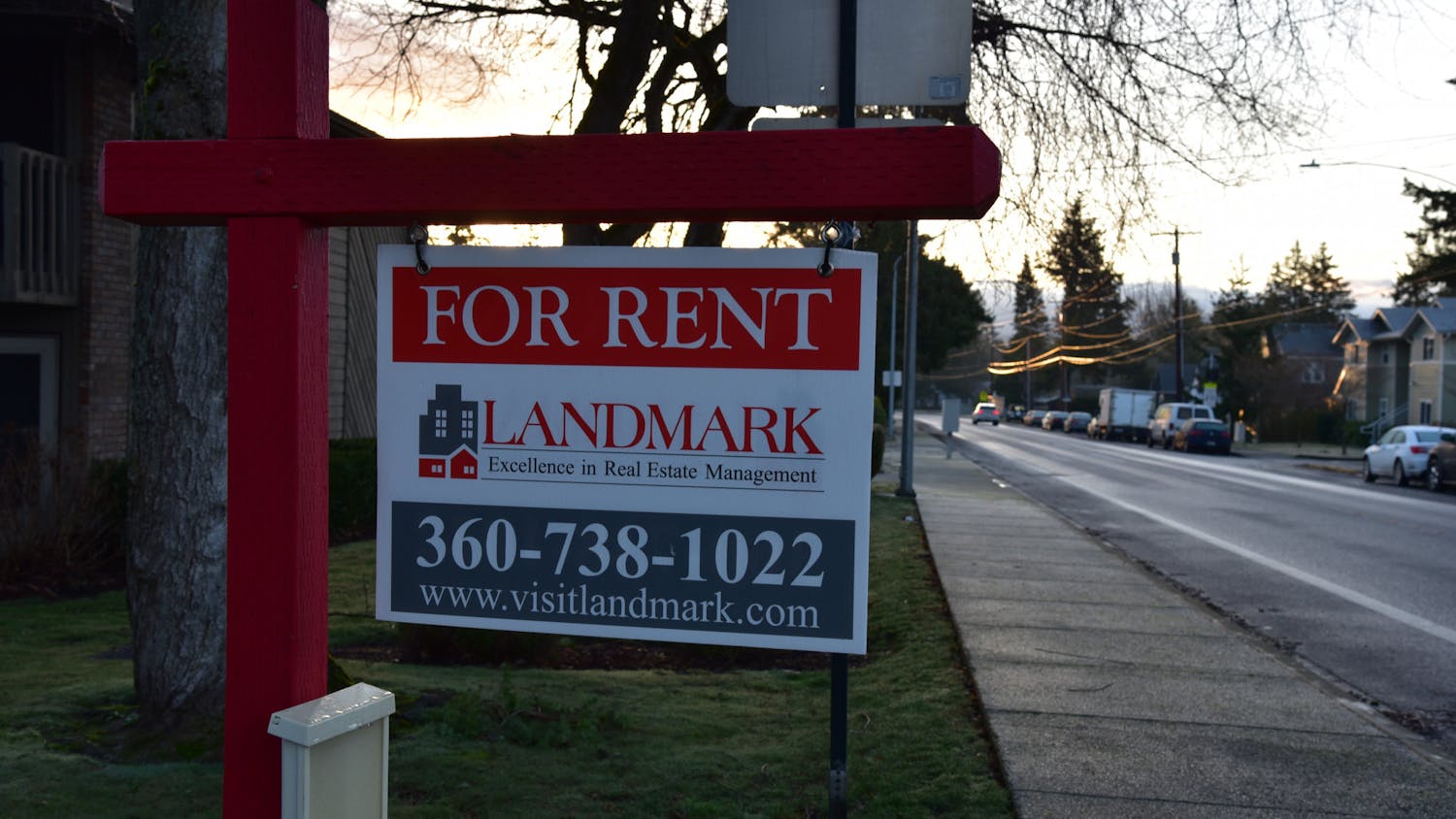Imagine this: five years from now, an above-median working class person in Bellingham will not be able to afford to buy a house.
Bellingham Housing Statistics show that, of the 1,350 people added to the population each year, 76% are new residents with 24% being the result of natural increases, or more births than deaths. The availability of affordable housing in Bellingham is limited, with 30% of homes being affordable for those with median incomes. With more people moving to the area, this availability becomes even more scarce.
According to the City of Bellingham housing FAQ, the residential vacancy rate for homes in Bellingham is sitting at 1%, with rentals sitting at 3%. In comparison, the recommended rates for housing are 2% for homeowners and 5-7% for rentals.
The cost of living in Bellingham is rising faster than wages. While home values in Bellingham experienced a significant 137% increase from 2000 to 2016 according to housing statistics, wages have not shown a corresponding upward trend.
When it comes to renters, housing is considered affordable when the monthly costs are 30% of a household’s monthly income. But since Feb. 25, 2023, the average cost of renting has increased by 7% from the previous year, bringing the average cost to $1,450 a month for a one-bedroom apartment according to Zumper’s Bellingham rent prices.
“Housing in Bellingham, when it comes down to renting, is probably one of the worst things I've had to deal with while being up here," said Juila Bearden, a renter in Bellingham.
Renting in Bellingham isn’t young adult friendly, said Bearden. Two years ago, her rent was $1,300 – now, it has raised to $1,785.
“It’s expensive, the housing is awful half the time and it’s because it’s a college town; it’s kinda just given another way for landlords to get way too much money for their properties,” she said.
According to the Self-Sufficiency Standard 2020 report, for an adult to be considered living self-sufficiently they must be making $2,043 monthly, which is over half the cost of average rent.
Struggle of Residents
Even high-earning individuals are struggling to find suitable housing within reasonable price ranges, as a gradual inflation in the housing market is affecting everyone from renters to homeowners. It's not just those seeking rentals who are feeling the squeeze — even homeowners are noticing the dwindling supply of affordable housing. In fact, some who were able to secure housing just a decade ago are finding themselves priced out of the market entirely.
According to the City of Bellingham housing FAQ, “the inventory that is affordable to middle-income households is shrinking. Demand is increasing, but wages have not kept pace with housing costs. From 2000 to 2020, the median family income in Bellingham increased by 20% while the median home value increased by nearly 80%.”
The availability for housing is not the same as it was 10 years ago when resident Dawn Thompson moved to Bellingham from Florida. She has noticed a lot of her fellow coworkers and friends struggling to find a house that fits in their budget.
“It takes people a lot of time to find a house that they like, within their means, even if they make money like nurses. It's still difficult to find housing in a desirable area, near work, that is also within reason for your income,” said Thompson, a homeowner and nurse.
With Bellingham’s limited supply of land to build on between the ocean and the mountains, the high demand to live in the area only continues to grow. Many people desire to move to Bellingham for its scenic views, laidback lifestyle and proximity to Western Washington University, said Bellingham real estate broker Brandon Nelson.
According to Nelson, the attraction of Bellingham is playing a role in the increasing costs for its residents.
“It’s new money, new people coming to the area bringing their money growth," he said. "It could happen to a rural area the same way, it's just we're seeing it in Bellingham because we're so limited on available buildable land.”
Solutions are not easy for a topic as complex as housing. As the city grows and develops, affordable housing will be a continued issue in relation to the decrease in land availability and maintaining the nature of the area.
Tourism
The influx of tourists is a major contributor to Bellingham's economic growth and the success of local businesses, according to the county’s tourism marketing plan report.
According to Visit Bellingham, “recent data released by Tourism Economics shows that direct visitor spending’s economic impact regained some ground in Whatcom County last year, increasing 38.4% from 2020 to 2021 to an annual total of $527.4M.”
The figures indicate Bellingham's allure as a travel hotspot remains strong even while healing from a global pandemic.
Nelson said other states face more severe issues than Washington, like more extreme wildfires and a higher cost of living. He said for many, Washington is a refuge.
“You come up to sweet charming, mild weather Bellingham; it's like paradise,” Nelson said.
Student Living
Rent in Bellingham varies by location, but for most students, sharing a space with roommates is necessary to afford it.
“I’m lucky with my financial situation, but imagine that you’re working minimum wage at McDonald’s, it’s gonna be tough just having that job and paying for rent on your own,” said Beau Demlar, a student at Western. “Most of the places for one person were upwards of $1,000 a month, and that’s pretty hefty for the average 18-year-old,” he said.
To secure reasonably priced housing, Demlar recommended browsing various websites like Facebook Marketplace and exercising patience until the ideal listing becomes available in the area.
“The best time I believe is in between years and during breaks. It’s because people are either quitting or graduating school at these times, so people get desperate for another housemate because they need to pay their rent,” Demlar said.
Malu Munizza, a first-year student at Western who moved to Bellingham for her education, is experiencing an unexpected increase in rental prices due to the ongoing demand for student housing.
“It’s crazy how much rent is going up each year in Bellingham," she said. "Before I moved into my apartment, the rent went up $100 from last year. I know a lot of apartments are going up another $100 in rent this fall.”
The limited availability of affordable housing options that fit within a student budget is making it challenging for student renters in a college town.
“I would expect this of places like Seattle or bigger cities, but it’s surprising for Bellingham. It makes me worried and scared for how much rent in Bellingham will be in five years,” Munizza said.
Housing Resources
The city is taking steps to address the issue of high housing prices by offering various resources to provide affordable housing, such as funding, home rehabilitation loan programs and affordable housing incentives. These initiatives aim to make housing more accessible and affordable for everyone in the community.
The City of Bellingham offers approximately $3 million in rental assistance and supportive services each year to help low-income tenants maintain their housing and receive other vital human services.
Additionally, Bellingham has formed partnerships with Kulshan Community Land Trust and the Washington State Housing Finance Commission to assist low-income homebuyers with down payment assistance and closing cost coverage.
According to the City of Bellingham housing FAQ, “to date, the city has helped 128 low-income families purchase homes in Bellingham. The average down payment assistance provided has been $26,000.”
Health and Community Services of Whatcom County are anticipating $113,151,164 of funding in 2023 going directly towards helping with housing and homelessness in a recent update on their programs.
For off-campus students in need of support, Western offers resources to address financial challenges. Their Basic Needs Support page lists a variety of resources available to students, including help with food, utility bills and legal issues related to renting.
To make food more accessible, the campus has multiple food pantries and a Swipe Out Hunger program that provides free meals to students in need. Although the program is temporarily suspended until the beginning of spring quarter, swipe donations are still accepted.
According to a recent Bellingham Residential Survey, over 90% of respondents rated their quality of life in this city as either excellent or good.
Jase Picanso (he/him) is a city life reporter for The Front. He is a third-year student majoring in Public Relations. His work focuses on local events, organizations, resources and community perspective and experiences on current world topics.
You can contact him at Jasepicanso.thefront@gmail.com






